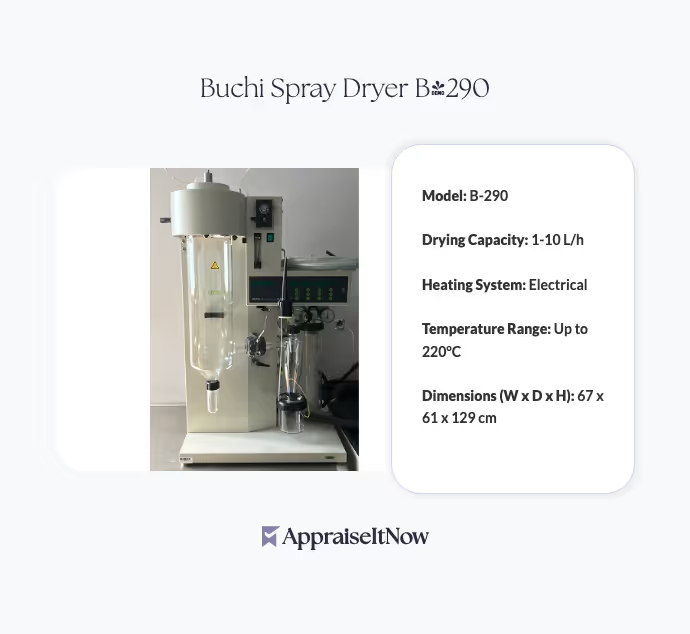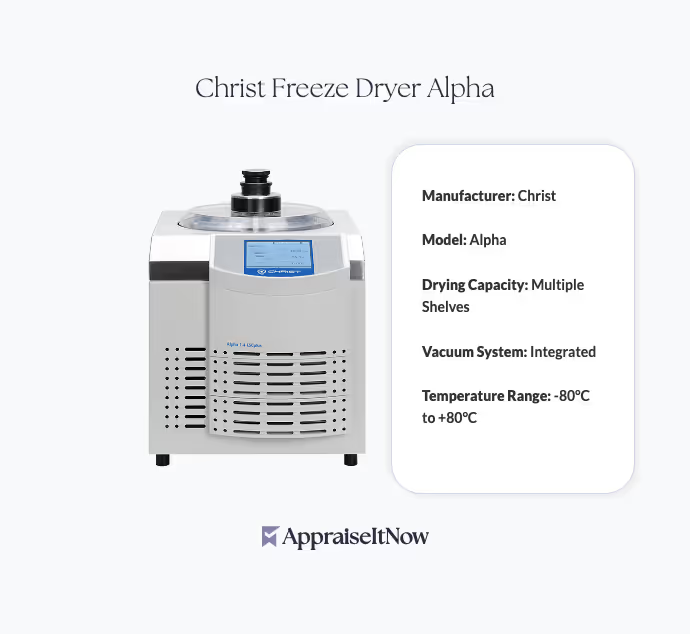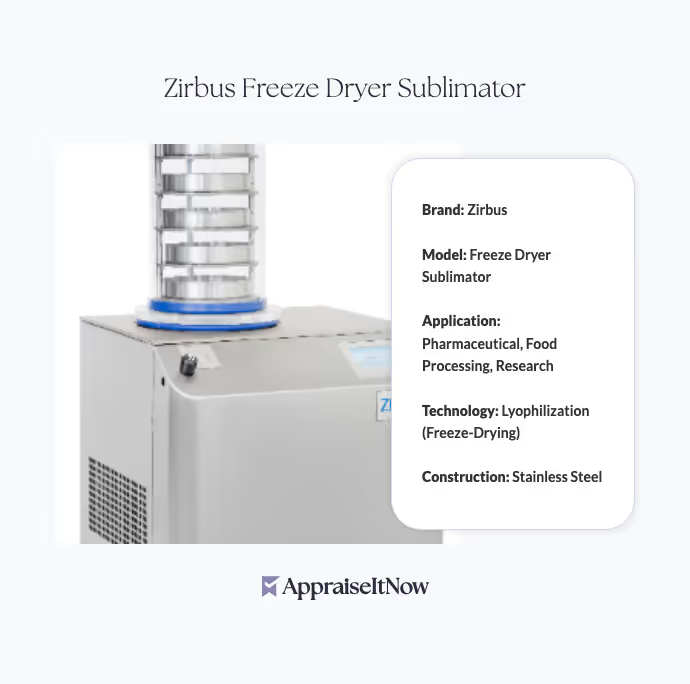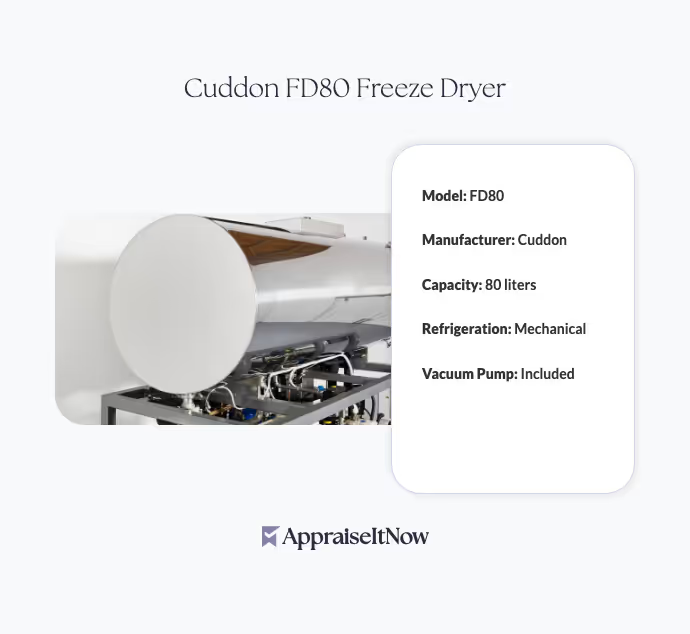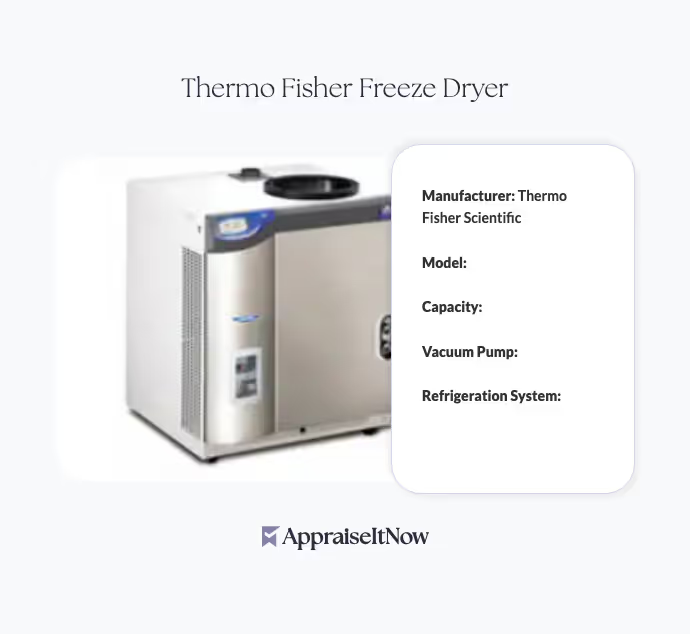<h1>How to Get Your Buchi Spray Dryer B-290 Appraised</h1>
<p>The Buchi Spray Dryer B-290 is a highly specialized piece of equipment used across pharmaceutical, food, and chemical manufacturing industries. If you own or are considering purchasing this robust machine, obtaining an accurate professional appraisal is essential for making informed decisions about investment value, insurance coverage, or sale purposes. Current market estimates place the B-290's value between <strong>$100,000 and $150,000</strong>, though individual units vary significantly based on condition, age, and operational history.</p>
<h2>Understanding Your B-290's Market Position</h2>
<p>Since its introduction in 1990, the Buchi B-290 has earned a reputation for reliable performance in drying applications. The machine's ability to efficiently convert liquid and slurry materials into fine powders makes it indispensable in pharmaceutical formulation, food ingredient processing, and specialty chemical manufacturing. Understanding current market pricing helps you evaluate whether your equipment represents fair value for potential buyers or whether purchasing one aligns with your facility's budget expectations.</p>
<p>The B-290's market value reflects more than just equipment age—it encompasses the machine's technical specifications, operational condition, maintenance history, and your specific industry's demand for used processing equipment. When evaluating <a href="/types/lab-equipment">lab equipment</a> and <a href="/types/chemical-equipment">chemical equipment</a> assets, professional appraisers consider these factors systematically to establish defensible market valuations.</p>
<h2>Key Factors That Influence B-290 Valuation</h2>
<p>Several interconnected factors determine where your specific unit falls within the $100,000-$150,000 range. Understanding these elements helps you prepare documentation that supports accurate appraisal and demonstrates your equipment's true market position.</p>
<p><strong>Equipment age and operational hours</strong> represent the primary value drivers. A B-290 manufactured in 1992 with 5,000 documented operating hours will appraise differently than a 2008 model with 15,000 hours. Similarly, whether your unit has been used continuously or operated seasonally affects depreciation calculations. Professional appraisers examine maintenance logs and service records to establish realistic usage patterns, which directly impacts estimated remaining equipment life.</p>
<p><strong>Condition and maintenance history</strong> significantly affect valuation. Units that have been properly maintained with regular calibration, documented preventive servicing, and immediate attention to wear items command premium pricing. Conversely, equipment showing deferred maintenance, worn seals, or corroded components typically appraises at the lower end of market ranges. The stainless steel construction of the B-290 resists corrosion well, but units that have processed corrosive materials may show accelerated wear requiring documented refurbishment assessment.</p>
<p><strong>Included accessories and peripherals</strong> directly impact overall asset value. A B-290 sold with compatible peristaltic pumps, process chillers, specialized atomizers, and spare nozzles may carry 15-25% premium valuation over a bare-unit sale. Appraiser evaluate whether included equipment is original Buchi components or compatible third-party additions, as this distinction affects both functionality and resale appeal.</p>
<div class="callout tip"><p><strong>Value Enhancement Insight</strong></p>
<p>Complete documentation of all included accessories, original purchase receipts, and compatibility certifications can increase your B-290's appraised value by recognizing the full asset package potential buyers acquire.</p></div>
<h2>Preparing Documentation for Your Appraisal</h2>
<p>When you engage a professional appraiser, comprehensive documentation directly supports accurate valuation. The strongest appraisals begin with thorough preparation on your part, ensuring nothing that could support higher valuations gets overlooked.</p>
<p><strong>Service records and maintenance logs</strong> form the foundation of condition assessment. These documents demonstrate whether your B-290 has received appropriate care and help appraisers evaluate remaining useful equipment life. Original calibration certificates, documented temperature accuracy validations, and spray chamber cleaning records all contribute to establishing that your unit operates reliably. If maintenance logs have been maintained electronically or through service contracts with Buchi-certified technicians, gather those records for appraiser review.</p>
<p><strong>Original equipment documentation</strong> including purchase invoices, user manuals, equipment specifications, and parts lists supports both authenticity verification and feature identification. Serial number documentation proving your B-290's manufacturing date and original configuration helps appraisers apply appropriate valuation benchmarks. Many units were modified or upgraded over their operational life—documentation of these improvements (such as software updates, control system upgrades, or enhanced atomizer configurations) can positively influence valuation when verified and dated.</p>
<p><strong>Calibration and compliance certificates</strong> carry particular weight when your B-290 serves pharmaceutical or regulated food applications. Documentation showing current validation status, FDA compliance verification for relevant applications, and any specialized certifications required for your industry demonstrates your equipment's operational readiness. These certifications often facilitate sales to regulated manufacturers who cannot immediately recertify equipment themselves.</p>
<h2>Remote Appraisal vs. On-Site Inspection</h2>
<p>Can reliable valuations be completed remotely using photographs and documentation? Professional appraisers increasingly utilize hybrid approaches combining detailed remote review with optional on-site verification. For the B-290 specifically, much of the critical assessment can occur through high-quality photography, serial number verification, and documentation analysis.</p>
<p>Effective remote appraisals typically require high-resolution photographs from multiple angles capturing the spray chamber, control panel, exterior condition, and any visible wear indicators. Serial number clarity, readable manufacturer plates, and close-up images of any modifications or repairs help appraisers verify unit authenticity and condition. When you provide documentation of recent operation, test runs, or commissioned performance validations, these records substantially support remote valuation accuracy.</p>
<p>However, some situations benefit from in-person inspection. If your B-290 shows questionable condition, has been idle for extended periods, or if significant value hinges on detailed mechanical assessment, on-site appraisal verification ensures accuracy. Some appraisers recommend in-person evaluation when units will support high-value transactions or when insurance carriers require hands-on verification before issuing coverage. We help connect you with <a href="/types/equipment-and-machinery">equipment and machinery appraisers</a> who can determine whether your specific situation warrants remote-only or hybrid inspection approaches.</p>
<div class="callout note"><p><strong>Appraisal Flexibility</strong></p>
<p>Modern appraisal services often offer tiered engagement—initial remote assessment for preliminary valuation, with optional on-site verification if needed for transaction support or insurance documentation.</p></div>
<h2>Depreciation Methods and Valuation Standards</h2>
<p>Professional appraisers apply standardized depreciation methodologies when valuing used manufacturing equipment like the B-290. Understanding these approaches helps you recognize whether your appraisal report uses appropriate industry standards and methodology.</p>
<p><strong>Straight-line depreciation</strong> represents the most common method for equipment valuation, assuming equal annual value decline over estimated useful life. For laboratory spray dryers, typical useful life assumptions range from 15-20 years, depending on industry usage intensity and technological advancement rates. This method is straightforward but may not reflect real market conditions where equipment condition matters more than mathematical depreciation formulas.</p>
<p><strong>Market comparison approach</strong> examines recent B-290 sales through auction houses, broker listings, and private marketplace transactions. Appraisers adjust comparative sales for condition differences, included accessories, and market timing to establish your unit's fair market value. This method often produces more realistic valuations reflecting actual buyer behavior than depreciation calculations alone.</p>
<p><strong>Replacement cost approach</strong> calculates what new equivalent equipment would cost, then adjusts downward for your unit's age and condition. Current new B-290 pricing typically ranges $200,000-$250,000 depending on configuration and options, making replacement cost analysis particularly relevant for insurance valuation purposes. This approach often justifies higher valuations for well-maintained older units when new equipment costs have increased significantly since original purchase.</p>
<p>Professional appraisals typically employ multiple valuation methods, reconciling results to reach defensible final values. This comprehensive approach ensures accuracy while providing clear methodology documentation that courts, lenders, and insurers accept as USPAP-compliant valuation support.</p>
<h2>Who Typically Purchases Used B-290 Units</h2>
<p>Understanding your potential buyer pool helps contextualize market valuation. Academic research institutions often seek used B-290s for teaching labs where equipment investments face tighter budgeting constraints. Contract research organizations (CROs) regularly acquire used spray drying equipment for process development work not requiring state-of-the-art machinery. Small pharmaceutical startups and food ingredient processors frequently enter used equipment markets as cost-effective alternatives to new purchases. These diverse buyer profiles each bring different valuation perspectives—startups may pay premium prices for reliable equipment, while academic institutions often negotiate aggressively on pricing.</p>
<p>Understanding your likely buyer demographic helps appraisers position valuation within appropriate market segments. A unit destined for a CRO serving regulated pharmaceutical clients may carry different value than identical equipment purchased by a university research program. Professional appraisers with experience in <a href="/types/food-processing-equipment">food processing equipment</a>, <a href="/types/medical-equipment">medical equipment</a>, and specialized laboratory applications understand these market nuances and position valuations accordingly.</p>
<h2>Valuation Types and Stakeholder Requirements</h2>
<p>Different stakeholders require different appraisal report formats and valuation perspectives. Knowing which type you need before engaging an appraiser ensures you receive documentation that serves your specific purpose effectively.</p>
<p><strong>Fair market value</strong> represents the most common appraisal type, defining the price at which your B-290 would change hands between willing buyers and sellers, neither under pressure to complete the transaction. This valuation supports general asset documentation, estate planning, and typical sale scenarios. Fair market value appraisals typically form the baseline for insurance coverage discussions and internal accounting documentation.</p>
<p><strong>Replacement cost valuation</strong> calculates what you would need to spend acquiring equivalent equipment today, useful for insurance purposes and business interruption assessments. Replacement cost often exceeds fair market value significantly, particularly when equipment has appreciated in scarcity since original purchase or when new equipment pricing has escalated substantially.</p>
<p><strong>Liquidation or forced-sale value</strong> applies when time pressure or distressed circumstances require rapid equipment monetization. This valuation typically runs 60-75% of fair market value, reflecting auction house commissions, rapid-sale discounting, and buyer acquisition costs in accelerated transaction environments. Lenders and workout specialists often request this valuation type when evaluating collateral liquidation scenarios.</p>
<div class="callout tip"><p><strong>Appraisal Type Selection</strong></p>
<p>Match your appraisal request to your intended use: fair market value for most transactions and insurance, replacement cost for comprehensive coverage documentation, and forced-sale value only when rapid liquidation scenarios apply.</p></div>
<p>Certified appraisals from credentialed experts—including AAA, ISA, ASA, CAGA, and AMEA credentials—carry legal acceptance across financial institutions, insurance carriers, and court systems. USPAP-compliant appraisal reports provide the structured documentation lenders require for equipment financing, insurers need for coverage validation, and attorneys request for litigation support or estate settlement purposes.</p>
<h2>Accessories, Modifications, and Value Impact</h2>
<p>The baseline B-290 spray dryer value assumes a standard configuration with typical accessories. However, many operational units have been customized or upgraded, and these modifications can substantially affect valuation—sometimes positively, sometimes negatively.</p>
<p>Original Buchi components including specialized spray chambers, proprietary control systems, and authentic replacement parts maintain or enhance value because buyers understand their compatibility and reliability. Third-party peripherals like process chillers, pump systems, and collection equipment can add value if compatible and well-maintained, but may create valuation uncertainty if compatibility documentation is unclear. Appraiser typically discount non-original modifications unless comprehensive documentation proves compatibility and condition quality.</p>
<p>Process chamber modifications or non-standard configurations sometimes reduce valuation if they limit the equipment's flexibility for other applications. Conversely, upgrades to control systems, enhanced safety features, or environmental modifications that support regulated manufacturing often justify premium valuation when properly documented and validated.</p>
<h2>Spare Parts Availability and Support Considerations</h2>
<p>The availability of spare parts and manufacturer support significantly influences B-290 valuation, particularly for older units. Since its 1990 introduction, Buchi has maintained parts support for the B-290 model line, though some specialized components have evolved across product updates. Professional appraisers evaluate parts availability by consulting manufacturer support documentation and current spare parts pricing, recognizing that units requiring proprietary or now-obsolete components may carry reduced valuation.</p>
<p>Equipment serviceable by multiple vendors commands premium valuation over units requiring exclusive factory support. Units with documented relationships with authorized Buchi service centers, or those located in regions with established service infrastructure, typically appraise higher than identical equipment in geographically isolated locations. Geographic consideration matters when establishing fair market value, as buyer acquisition costs for service support affect practical ownership value.</p>
<h2>Timeline and Service Availability for Your Appraisal</h2>
<p>How long does a professional B-290 appraisal typically require? Most comprehensive equipment appraisals complete within 7-14 business days from initial documentation submission to final report delivery. Remote appraisals can move more quickly—often 3-5 business days for preliminary valuations based on photos and documentation. If your appraisal requires on-site inspection, add 2-3 weeks to accommodate appraiser scheduling and travel logistics.</p>
<p>Expedited appraisal services are available when transaction timelines demand faster valuation. Rush appraisals typically complete within 2-3 business days but may carry premium service fees reflecting accelerated processing. We connect you with experienced appraisers offering flexible engagement timelines to match your transaction needs, whether you're working within standard timelines or facing compressed decision windows requiring rapid valuation documentation.</p>
<h2>Connecting with Qualified B-290 Appraisers</h2>
<p>Obtaining accurate valuation begins with engaging appraisers who understand specialized <a href="/types/lab-equipment">laboratory equipment</a> and manufacturing machinery. AppraiseItNow connects you with credentialed experts across the United States who bring manufacturer knowledge, market familiarity, and transaction experience to B-290 valuations.</p>
<p>When selecting an appraiser, verify credentials in equipment valuation disciplines, confirm experience with pharmaceutical and food processing equipment, and review their approach to documentation requirements. Ask potential appraisers about their familiarity with current B-290 market transactions, their valuation methodology for spray drying equipment, and their experience supporting your specific appraisal purpose—whether for sale, insurance, financing, or estate documentation.</p>
<p>Our streamlined online submission process lets you upload photographs, equipment specifications, maintenance documentation, and serial numbers securely. We match you with qualified appraisers near your equipment location who understand regional market conditions and can provide USPAP-compliant valuations suitable for legal proceedings, insurance coverage, or transaction documentation.</p>
<div class="callout note"><p><strong>Key Takeaway</strong></p>
<p>A professional Buchi Spray Dryer B-290 appraisal provides defensible valuation documentation within the $100,000-$150,000 market range, supported by clear methodology and comprehensive condition assessment. Whether you're buying, selling, insuring, or liquidating this specialized equipment, certified appraisal services ensure accurate value documentation that stands up to professional and legal scrutiny.</p></div>
